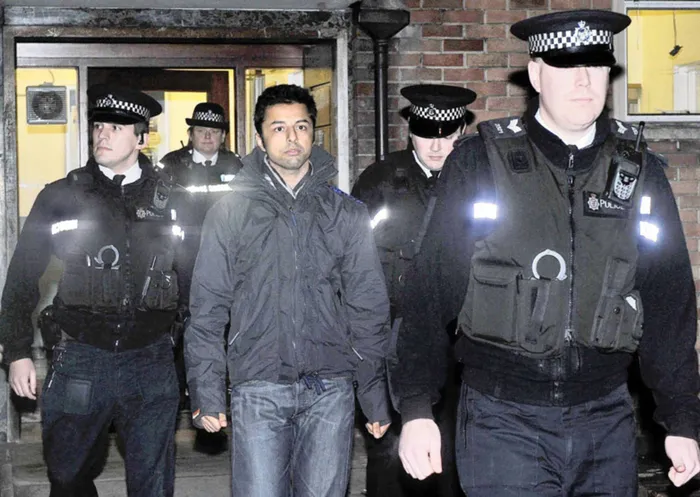Cele our Achilles heel

Shrien Dewani leaves Southmead police station in Bristol in December. Shrien Dewani leaves Southmead police station in Bristol in December.
Despite the odds seemingly overwhelmingly in favour of the South African authorities, honeymoon murder accused Shrien Dewani could yet beat extradition thanks to National Police Commissioner General Bheki Cele and local politicians.
The man who wrote the book on Britain’s extradition says his “best win yet” was managing to thwart the extradition of a murder accused to India after “terrible statements” from the police chief there.
In a pointed reference to Dewani, Cele publicly said “a monkey” had come from London to have his wife killed - a statement pounced on by the Dewani camp, who argue that the 31-year-old care home millionaire would face prejudice if he returns to South Africa to face charges of murdering his wife Anni.
Lawyers for the South African government and Dewani will square off tomorrow at Britain’s own “Guantanamo Bay” - Belmarsh Magistrate’s Court in London.
The court, situated in a prison complex, was used during the Iraq invasion to hold prisoners without trial or charge.
Clive Nicholls QC, a specialist in extradition, told The Star he successfully fought the extradition of murder accused Nadeem Saifi, who allegedly ordered a hit on a compatriot in the music industry.
The key evidence was the confession from a co-conspirator who fingered Saifi as an instigator.
“In that case, the police chief made terrible statements. I fought that successfully on the basis that he wouldn’t get a fair trial if returned to India. It was my best win yet,” said Nicholls.
During the appeal, heard in 2000, Nicholls also argued that Saifi would suffer further bias because he was a Muslim.
The details of the Saifi case will not be lost on Dewani’s counsel, Clare Montgomery QC and Julian Knowles, who co-authored the book The Law of Extradition and Mutual Assistance with Nicholls.
Nicholls and Knowles also acted for former Chilean dictator Augusto Pinochet, who ultimately avoided extradition to Spain, where he faced charges of torture and murder.
South African authorities allege Dewani orchestrated a fake hijacking - with Cape Town-based taxi driver Zola Tongo at the centre of the set-up - in which his wife would be murdered.
His defence team argue that the attempt to pin the murder on Dewani has been politically orchestrated to protect South Africa’s tourism industry.
Western Cape Premier Helen Zille, voicing her concern about “the abuse of South Africans”, has also called for Dewani’s extradition.
The Dewani camp have cast suspicion on the speedy trial of Tongo, who, in a plea agreement with the State, confessed to being offered R15 000 by Dewani for his role in the murder and the alleged torture of one of the “hijackers”, Xolile Mngeni.
They also have latched on to the “dubious” presiding Western Cape Judge President John Hlophe, who accepted money from asset management company Oasis without declaring it.
South Africa, along with India, are two of the 26 countries afforded special status under Britain’s extradition law, meaning they are not required to present a prima facie case before the courts to effect an extradition.
During the bail application, magistrate Howard Riddle said: “It is clear there is evidence that has been put before me, and on the face of it, and I put it no higher than that, evidence on which a trial could evidently proceed.”
Said Nicholls, referring to the revised 2003 Extradition Act: “If the conduct amounted to a crime here (Britain), then that’s enough.”
Although the 2003 law was designed to speed up proceedings, extradition hearings often lasted two years and could take as long as four, with appeals going to the High Court and ultimately the Supreme Court, he added.
The defence could try to argue on humanitarian grounds, but that would always be an uphill battle, considering the high regard in which South African courts were held around the world, Nicholls said.
It seems unlikely Dewani will attend court tomorrow, with his celebrity publicist Max Clifford and a steady stream of friends and family attesting to the young widower’s ill-health.
Dewani was not present at the first session at Westminster Magistrate’s Court after a psychiatrist diagnosed him as suffering from “acute stress disorder” and “oppressive adjustment disorder”.
If Dewani’s poor health prevents him from attending on Tuesday, Riddle, will have to decide whether the hearing will continue.
A confidant in the Dewani camp said the accused’s ill-health made it virtually impossible for him to instruct his legal team.
South African investigators were recently in London to put together a “watertight” case against Dewani. - The Star